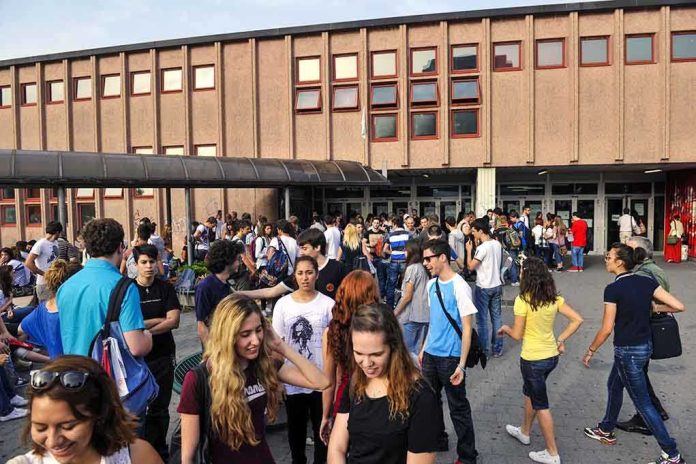
School surveillance companies are monitoring children on personal devices 24/7, quietly undermining privacy and parental rights far beyond campus walls.
Story Snapshot
- UC San Diego study finds 86% of school safety tech companies monitor students around the clock, including at home.
- Widespread surveillance raises serious concerns about privacy, lack of transparency, and accountability.
- School districts face pressure to balance safety mandates with constitutional rights and family autonomy.
- Industry expansion and new laws fuel an erosion of student and family privacy with limited oversight.
Peer-Reviewed Study Exposes Pervasive Student Surveillance
On July 8, 2025, UC San Diego researchers published a systematic review showing 86% of school safety technology companies track students 24/7, including on personal devices and outside school hours. This surveillance extends into family homes, raising the stakes for privacy and parental control. The study, the first of its kind, found most companies provide little public information about how their monitoring algorithms work, the data they collect, or how errors and bias are managed. For families concerned about government and corporate overreach, these findings confirm fears that digital safety mandates may come at the cost of core constitutional rights.
The use of surveillance technology in public schools accelerated after a series of school shootings and expanding concerns over student mental health. Remote learning during the COVID-19 pandemic normalized digital monitoring, with districts rapidly adopting software that tracks online activity, messages, and even location data. State legislation, such as California’s SB 906, requires schools to proactively report threats and comply with safety protocols, often relying on third-party vendors with limited transparency. This shift puts administrators in a position to weigh safety against privacy, but the lack of oversight gives vendors significant power over student data and family life.
Power Dynamics: Vendors, Schools, and Families
School districts and administrators ultimately decide which surveillance technologies to adopt, often based on vendor claims rather than independent audits or public input. Companies operate with minimal external oversight, while families and students have little recourse or say in how their data is used. Privacy advocates and civil liberties organizations have raised alarms about the scope of monitoring, pointing out that most families never consented to 24/7 surveillance on personal devices. This power imbalance threatens American principles of individual liberty and parental authority, especially as districts try to comply with expanding state and federal mandates.
The UC San Diego study highlights not only the prevalence of surveillance, but also the absence of public information on algorithmic decision-making, error rates, and bias mitigation. Researchers and privacy experts warn that these gaps create risks for student autonomy and can foster mistrust between schools and families. Meanwhile, some school officials argue that comprehensive monitoring is necessary to meet safety requirements and avoid litigation, even as critics call for stricter oversight and transparency.
Legislative Mandates and Industry Growth Fuel Privacy Erosion
Recent legislative changes, including expanded school safety mandates in California, have driven rapid growth in the school surveillance industry. The sector now encompasses both school-issued and personal devices, with companies marketing their products as comprehensive safety solutions. While these tools may help prevent violence or self-harm, they also introduce risks of data breaches, profiling, and unintended consequences for student expression. Economic incentives and regulatory pressure have led to widespread adoption, but the cost to family privacy and constitutional rights remains largely unexamined.
Schools’ safety tools are spying on kids — even at home https://t.co/hiYweKdC9y
— ConservativeLibrarian (@ConserLibrarian) August 25, 2025
Ongoing debates focus on the need for transparency, third-party audits, and industry standards to ensure that monitoring does not undermine core American values. The UC San Diego research team calls for more public information and independent review, while privacy advocates urge policymakers to protect students from excessive surveillance. As technology continues to outpace regulation, families and communities must remain vigilant about protecting their rights in the face of expanding government and corporate oversight.
Sources:
San Diego County Office of Education, School Safety



